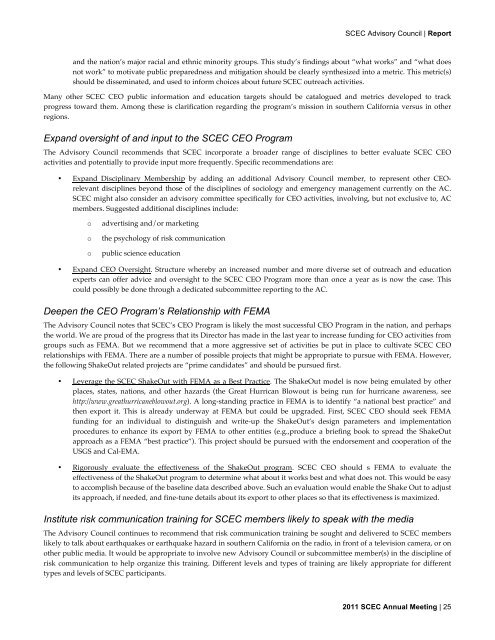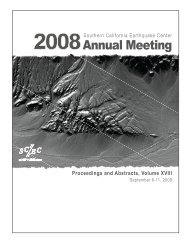Annual Meeting - SCEC.org
Annual Meeting - SCEC.org
Annual Meeting - SCEC.org
Create successful ePaper yourself
Turn your PDF publications into a flip-book with our unique Google optimized e-Paper software.
<strong>SCEC</strong> Advisory Council | Report<br />
and the nation’s major racial and ethnic minority groups. This study’s findings about “what works” and “what does<br />
not work” to motivate public preparedness and mitigation should be clearly synthesized into a metric. This metric(s)<br />
should be disseminated, and used to inform choices about future <strong>SCEC</strong> outreach activities.<br />
Many other <strong>SCEC</strong> CEO public information and education targets should be catalogued and metrics developed to track<br />
progress toward them. Among these is clarification regarding the program’s mission in southern California versus in other<br />
regions.<br />
Expand oversight of and input to the <strong>SCEC</strong> CEO Program<br />
The Advisory Council recommends that <strong>SCEC</strong> incorporate a broader range of disciplines to better evaluate <strong>SCEC</strong> CEO<br />
activities and potentially to provide input more frequently. Specific recommendations are:<br />
• Expand Disciplinary Membership by adding an additional Advisory Council member, to represent other CEOrelevant<br />
disciplines beyond those of the disciplines of sociology and emergency management currently on the AC.<br />
<strong>SCEC</strong> might also consider an advisory committee specifically for CEO activities, involving, but not exclusive to, AC<br />
members. Suggested additional disciplines include:<br />
o advertising and/or marketing<br />
o the psychology of risk communication<br />
o public science education<br />
• Expand CEO Oversight. Structure whereby an increased number and more diverse set of outreach and education<br />
experts can offer advice and oversight to the <strong>SCEC</strong> CEO Program more than once a year as is now the case. This<br />
could possibly be done through a dedicated subcommittee reporting to the AC.<br />
Deepen the CEO Program’s Relationship with FEMA<br />
The Advisory Council notes that <strong>SCEC</strong>’s CEO Program is likely the most successful CEO Program in the nation, and perhaps<br />
the world. We are proud of the progress that its Director has made in the last year to increase funding for CEO activities from<br />
groups such as FEMA. But we recommend that a more aggressive set of activities be put in place to cultivate <strong>SCEC</strong> CEO<br />
relationships with FEMA. There are a number of possible projects that might be appropriate to pursue with FEMA. However,<br />
the following ShakeOut related projects are “prime candidates” and should be pursued first.<br />
• Leverage the <strong>SCEC</strong> ShakeOut with FEMA as a Best Practice. The ShakeOut model is now being emulated by other<br />
places, states, nations, and other hazards (the Great Hurrican Blowout is being run for hurricane awareness, see<br />
http://www.greathurricaneblowout.<strong>org</strong>). A long-standing practice in FEMA is to identify “a national best practice” and<br />
then export it. This is already underway at FEMA but could be upgraded. First, <strong>SCEC</strong> CEO should seek FEMA<br />
funding for an individual to distinguish and write-up the ShakeOut’s design parameters and implementation<br />
procedures to enhance its export by FEMA to other entities (e.g.,produce a briefing book to spread the ShakeOut<br />
approach as a FEMA “best practice”). This project should be pursued with the endorsement and cooperation of the<br />
USGS and Cal-EMA.<br />
• Rigorously evaluate the effectiveness of the ShakeOut program. <strong>SCEC</strong> CEO should s FEMA to evaluate the<br />
effectiveness of the ShakeOut program to determine what about it works best and what does not. This would be easy<br />
to accomplish because of the baseline data described above. Such an evaluation would enable the Shake Out to adjust<br />
its approach, if needed, and fine-tune details about its export to other places so that its effectiveness is maximized.<br />
Institute risk communication training for <strong>SCEC</strong> members likely to speak with the media<br />
The Advisory Council continues to recommend that risk communication training be sought and delivered to <strong>SCEC</strong> members<br />
likely to talk about earthquakes or earthquake hazard in southern California on the radio, in front of a television camera, or on<br />
other public media. It would be appropriate to involve new Advisory Council or subcommittee member(s) in the discipline of<br />
risk communication to help <strong>org</strong>anize this training. Different levels and types of training are likely appropriate for different<br />
types and levels of <strong>SCEC</strong> participants.<br />
2011 <strong>SCEC</strong> <strong>Annual</strong> <strong>Meeting</strong> | 25



